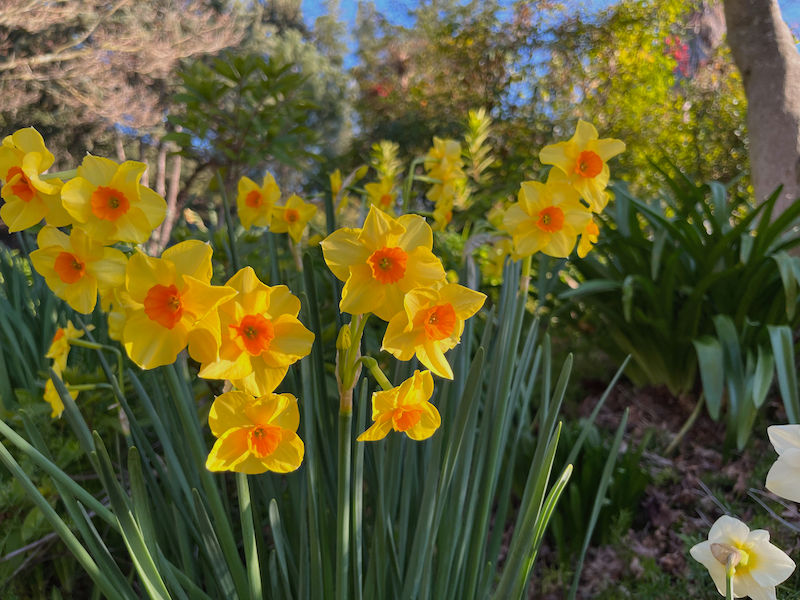March into Spring!
- Cynthia Brian

- Mar 2, 2023
- 4 min read
“No occupation is so delightful to me as the culture of the earth, and no culture comparable to that of the garden.’ — Thomas Jefferson”
Throw open your windows! Inhale the sweet smells of the blossoms. Bradford pears, cherry plums, crabapple, peach, and tulip magnolias are in full bloom.
Flocks of doves have begun their annual aerial acrobats, raptors are kettling in the warmer thermals, cows are happily grazing on the green grass, and bees are buzzing and pollinating.
The hills are emerald, the creeks are flowing, and sunny daffodils brighten our roadways. Spring is in the air!
As excited as I am to start sowing summer veggies, it is still too early. March is a month to peruse catalogs and groom our beds as nature’s winter slumber awakens. This is a month of garden transition with unpredictable weather, chilly mornings, warm afternoons, and frosty nights. Additional rain is necessary and anticipated.
With preparation and care, we can give our gardens a boost for spring by cleaning our garden beds. Remove dead leaves, branches, and debris that have accumulated over winter. By doing so we’ll prevent pests and diseases from invading while making our gardens tidier and ready for planting in April and May.
It seems that overnight my garden burst into bloom. The Amaryllis that I’ve been carefully tending opened its eyes to my delight.
Bright pink Bergenia is bigger and fuller this year and even the yellow shamrocks are already on display, pre-St. Patrick’s Day. Many gardeners find oxalis to be a noxious weed, but I welcome it in my landscape. It covers the barren soil with electric yellow flowers and delicate clover-like leaves. I find it very pretty, and I’ve been growing it for several years without it invading unwanted locations.
Purple bearded iris don’t last long in bouquets, yet they are stunning and fragrant in the garden. Poor man’s saffron, more commonly known as calendula, has self-seeded on my hillside in blooms of orange and yellow. Red, pink, and white cyclamen are stretching their buds between the ferns while azaleas transform the garden from dull to dazzling.
Winter is waning. The garden is marching on.
THE GODDESS GARDENER’S MARCH GARDENING GUIDE
AMEND your soil with compost to add the nutrients necessary.
MAKE compost by combining green (nitrogen) and brown (carbon) materials. To a bucket, bin, or pile, add coffee grinds, tea bags, chicken and rabbit droppings, grass clippings, vegetable scraps, straw, leaves, shredded newspaper, hay, dead plants, cardboard, and paper. Keep moist and turn. Do not use the animal waste from any carnivorous animals, including dogs and cats, and do not add diseased plants to the bin or pile.
CHECK irrigation systems. Repair leaks, clogs, and broken sprinkler heads.
START seeds indoors if you want a head start on growing your favorite vegetables. You will have to harden them off before planting in the garden.
FORAGE for wild greens including Miner’s lettuce, mustard, creek watercress, and wild strawberries. The young leaves are delicious in salads and sautées.
ORDER tubers and root starters from Renees Garden for the best selection of horseradish, potatoes, onions, and asparagus for spring planting.
FERTILIZE trees, shrubs, and ground covers with organic feed.
APPLY snail bait around plants most susceptible to snail and slug damage or handpick the mollusks.
SPRAY roses, boxwoods, viburnum, iris, fruit trees, citrus trees, and crape myrtle trees with dormant oil to protect them from overwintering insects and fungal disease.
HARVEST lemons, limes, and oranges. The extra vitamin C will boost your immunity during this cold and flu season.
SHARPEN and clean tools.
AERATE lawns while the nights are still cool. Leave the plugs on the grass to feed the grass.
PULL weeds as they sprout.
CUT bouquets of daffodils, narcissus, viburnum, flowering quince, and Bergenia to brighten any room.
DIVIDE perennials including daylilies, agapanthus, yarrow, and phlox while they are semi-dormant.
FLOAT camellias in a pretty bowl and dispose of all fallen camellias from bushes.
KILL aphids with a strong spray of water or spray with a mixture of water and dishwashing detergent. Make sure to spray all sides of foliage and flowers.
LEARN what to do in your garden every month with the book, Growing with the Goddess Gardener, available at http://starstylestore.net
PLANT bare root roses, vines, and berry bushes.
PRUNE a branch of peach, plum, or pear and place the cutting in a tall vase to force the blooms for an enticing indoor arrangement.
Happy Gardening. Happy Growing. March in. March on.
Subscribed
Raised in the vineyards of Napa County, Cynthia Brian is a New York Times best-selling author, actor, radio personality, speaker, media and writing coach as well as the Founder and Executive Director of Be the Star You Are!® 501 c3. Tune into Cynthia’s StarStyle® Radio Broadcast at www.StarStyleRadio.com.
Her newest children’s picture book, No Barnyard Bullies, from the series, Stella Bella’s Barnyard Adventures is available now at www.cynthiabrian.com/online-store
For an invitation to hang out with Cynthia for fun virtual events, activities, conversations, and exclusive experiences, buy StarStyle® NFTs at https://StarStyleCommunity.com
Hire Cynthia for writing projects, garden consults, and inspirational lectures. Cynthia@GoddessGardener.com http://www.GoddessGardener.com
©Photos and Text 2023 Cynthia Brian. All rights reserved.
Thanks for reading StarStyle® Empowerment ! Subscribe for free to receive new posts and support my work. Subscribed






Comments